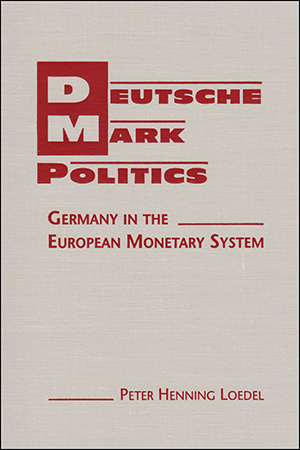
- 1999/264 pages
Deutsche Mark Politics:
Germany in the European Monetary System
Hardcover: $55.00
ISBN: 978-1-55587-835-1
Why is Germany prepared to sacrifice the deutsche mark for European Monetary Union? Peter Loedel’s novel analysis, incorporating domestic, European, and global aspects of German monetary policy, suggests that the institutional relationship between the Bundesbank and the federal government, together with Germany’s bargaining strategies toward European and global monetary-governance structures, can provide the answer to the deutsche mark puzzle.
Examining the record from 1985 through May 1998, Loedel challenges common conceptions of the Bundesbank’s independence. He also explores the ability of external structures to affect German monetary decisions. His presentation of political and economic forces offers fresh insight into the factors shaping German monetary politics and the future of EMU.





